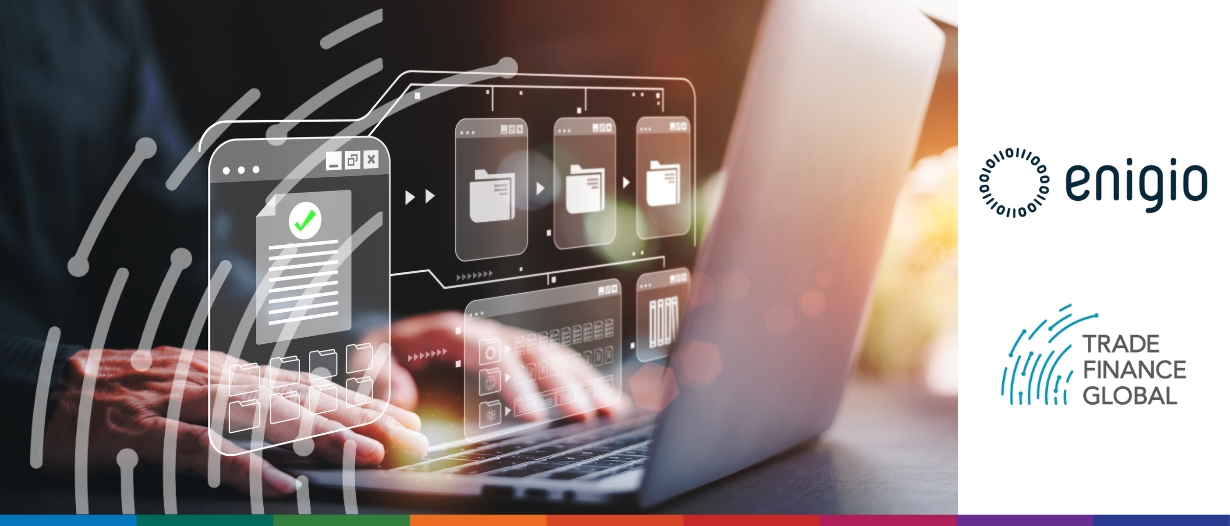Estimated reading time: 4 minutes
The Middle East has recently thrived by capitalising on digital advancements across various sectors.
The UAE, for example, has achieved nearly 100% digitalisation of government services, including free zones issuing licenses without the need for one’s physical presence.
Similarly, Saudi Arabia has introduced significant reforms to make living and working in the country more convenient..
Other GCC countries, such as Qatar, Oman, Kuwait, and Bahrain have accelerated their digital offerings across numerous sectors and have set ambitious targets for 2030, with digitisation & digitalisation featuring prominently in many plans.
Despite these advancements, global trade transactions have not yet fully embraced digitalisation. Given the high contribution of trade transactions to a country’s GDP, the lag raises the question:
‘If paper-based processes can be digitalised, why hasn’t this transition occurred more broadly?’
The answer lies in multiple factors, including but not limited to:
- the need for interoperability of data, documents and processes,
- secure data storage accessible only to those with permissions,
- digital documents need to be transferable and machine-readable to be future-ready,
- The ability to authenticate and verify documents as originals or copies,
- a myriad of open, closed and even no platforms to allow document movement.
Enigio’s trace: original offers a solution addressing all these needs.
Enigio’s technology is directly aligned with the United Nation’s Model Law on Electronic Transferable Records (MLETR) framework, which supports digital negotiable instruments. Simply put, any party that issues paper documents today can issue a document digitally, allowing it to be emailed, updated, contain attachments, verified, invalidated and transferred to another party who can continue to manage it freely without further cost.
An audit trail marked on a distributed ledger provides immediate authentication of original documents on the public ledger.
Enigio’s trace:original solution already has various use cases, including:
- bills of exchange
- promissory notes
- guarantees
- export letters of credit
- documentary credits
- account opening forms
- certificates
Enigio is optimistic that the adoption of its technology will expand across various industries that currently depend on paper documentation.
Furthermore, governments can accelerate their digital agendas to make it easier to do business, create an enhanced safe and financially regulated environment, and support the global ESG agenda.
Corporates can conduct business with ease, build a more inclusive trading ecosystem, access fast and efficient financing solutions, and reduce the cost of doing business, including any financed transactions.
Banks can create innovative ways to make global trade easier for customers, cut down on processing times by reducing manual interventions in transaction processing and introduce technology that allows cost reduction, fewer errors, and faster turnaround times, whilst upholding being environment-friendly.
Various different legal frameworks and regulations have helped increase the adoption of digital trade documents, including:
- Bahrain adopted MLETR in 2017, setting a precedent for digital trade in the region.
- Abu Dhabi Global Market (ADGM) enacted Electronic Transactions Regulations in 2021.
- UK’s Electronic Trade Documents Act (ETDA) of 2023 has been a game-changer for global trade, facilitating the recognition of digital documents in jurisdictions using English law. With English law governing around 75% of international trade transactions, this will have a significant impact on global trade. Kenya has already paved the way for fully digital transactions using electronic bills of exchange for exports to Belgium, under the UK ETDA.
- In June 2024, France adopted MLETR, showing the growing global acceptance of digital trade frameworks.
- DIFC in Dubai established the Digital Asset Law in 2024, permitting the recognition of digital documents as assets.
- The International Chamber of Commerce (ICC) Digital Standards Initiative (DSI) promotes global standards for digital trade.
With laws in place and technology to support digitalisation, it has been encouraging to see various Enigio clients benefit from adopting early and at pace. Here are some insights into their experiences with Enigio’s trace: original solution:
- A leading global bank noted that the solution has boosted their trade finance operations, significantly reducing processing times, transaction volumes, and improving security.
- A multinational corporation reported that the digitalisation of trade documents has streamlined their supply chain, providing greater transparency and efficiency.
- A major governmental agency highlighted that implementing trace:original aligns with their digital transformation goals, enhancing their regulatory framework and supporting economic growth.
The Middle East and Africa region stands at the tipping point of mass digital transformation in trade. By embracing solutions like Enigio’s trace:original, these regions can also lead the way in global trade digitalisation, driving economic growth, enhancing security, and fostering innovation.
One thing is for sure, the future of trade lies in digital documents and data, and the Middle East and Africa are well-positioned to capitalise on this opportunity now.





























